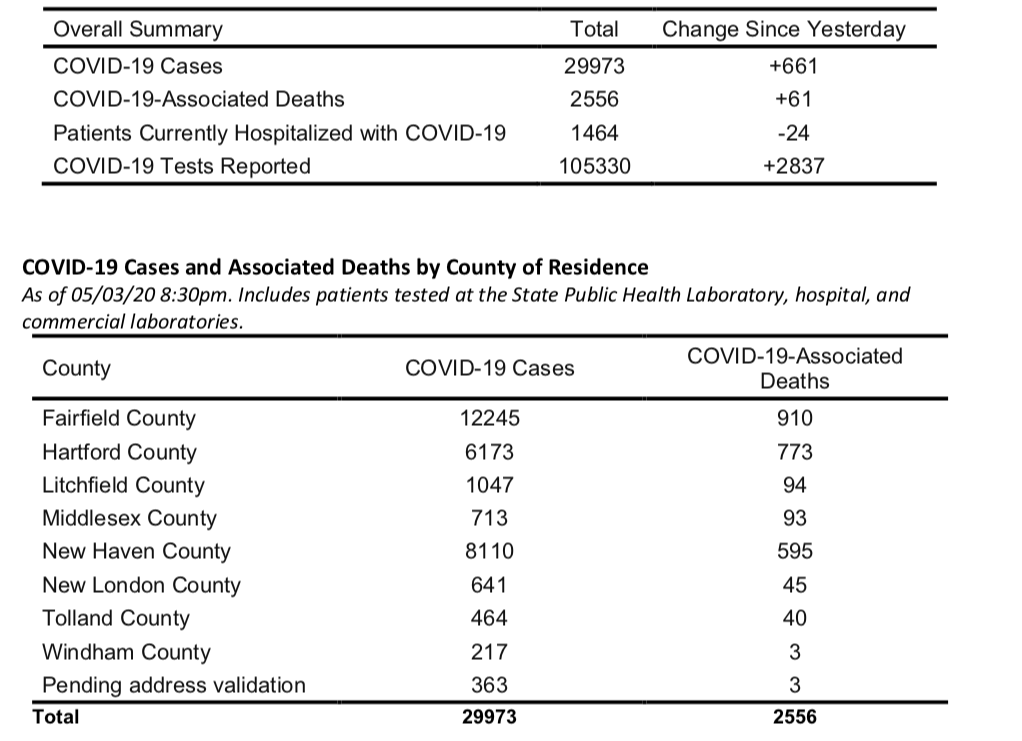Connecticut Takes Steps to Make Voting Safer, as COVID-19 Hospitalizations Continue to Decline

Audio By Carbonatix

The Secretary of State’s office plans to send absentee ballot applications to every registered voter this year. Photo credit: Chion Wolf, Connecticut Public Radio (courtesy of CTMirror.org)
Fairfield, Hartford, and New Haven counties are now all seeing a downward trend in hospitalizations.
By Patrick Skahill, Connecticut Public Radio for CTMirror.org
West Hartford specific information provided by Ronni Newton, We-Ha.com
For the 12th consecutive day, Connecticut’s COVID-19 hospitalizations have continued to decline, Gov. Ned Lamont said Monday.
In his regular daily briefing, Lamont said Fairfield, Hartford, and New Haven counties are now all seeing a downward trend in hospitalizations. And he said the death rate has been slightly lower over the last five days than it was over the previous five days.

But state Sen. Saud Anwar (D-South Windsor) cautioned that any reopening plans need to be approached “based on science and not emotion.”
Anwar is vice chair of the legislature’s Public Health Committee. He’s also a doctor who has been working in intensive care units. He joined the briefing remotely.
“I’m seeing, unfortunately, the ugly face of the disease … you have patients dying every single day,” Anwar said. “Just because the number of deaths have decreased does not necessarily mean that we are safe.”
Connecticut reported 61 additional COVID-19 deaths Monday, bringing the overall total to 2,556.
In West Hartford, there are 341 laboratory-confirmed positive cases of COVID-19, and 62 fatalities according to Monday’s report.
Still, the call to reopen businesses is growing across the state. Lamont said Monday that Connecticut small business owners “did very well” under the latest round of applications for the federal Paycheck Protection Program (PPP), but acknowledged the loans will only give businesses the “firepower” to get through a few more weeks, at best. But that’s only accounting for the businesses that were able to get the loan.
“That’s why we’re focused on May 20,” Lamont said. “We’re focused on getting things reopened.”
The governor said more than 30,000 Connecticut companies got approved. “That’s $2.5 billion dollars more to the state,” Lamont said. “This loan size is smaller than it was in the first round, but that also means more of our small businesses got access.”
In April, $349 billion allocated for PPP loans quickly dried up under a nationwide application surge. In Connecticut, $4.2 billion in aid was approved, but more than 15,000 small businesses were “frozen out,” because the program ran out of money, Lamont said.
Meanwhile, New Jersey Governor Phil Murphy announced all public and private schools will remain closed for the rest of the academic year in his state.
Lamont touched on the topic briefly Monday, and said an announcement on schools and summer camps is expected tomorrow.
State takes steps to make voting easier and safer
The state said Monday it will send absentee ballot applications to every Connecticut registered voter, part of an effort to address concerns that coronavirus could keep people away from the polls in this year’s primary and general elections. But it remains to be seen how any expansion of mail-in voting will square with strict, centuries-old statutes governing remote voting in Connecticut.
“No one should have to risk their health in order to vote,” said Secretary of State Denise Merrill on Connecticut’s Public Radio’s Where We Live. “Our first priority is to secure the polling places.”
COVID-19 has already caused Connecticut to delay its 2020 presidential primary twice. First from April to June, and then from June until the latest new date: Tuesday, Aug. 11.
Gov. Ned Lamont has said it’s likely some form of social distancing will remain in place throughout the summer, which has raised concerns about voters staying home or election officials abandoning their posts.
In response, Merrill said in a plan announced Monday that applications for absentee ballots will be sent to every registered voter in the state. The state said it will cover the cost of all postage.
It’s unclear how any expansion to absentee ballot voting will be implemented. Right now, Merrill said absentee ballot provisions are part of the state constitution, “which is very difficult to change.” But Merrill said there could be some wiggle room in a separate state statute that also governs absentee ballot voting, and more narrowly defines who qualifies to vote that way.
Currently, Connecticut allows absentee voting for active members of the military, people who will be out of town or can’t vote on election day because of religious reasons, certain members of the disabled community, and for some people who are ill.
“I would need an executive order from the governor or action by the legislature to change the statute,” Merrill said. “We’re trying to work with these definitions to be able to enable voters, as I said, not to have to choose between their health and their vote.”
As part of the new plan, Merrill said the state will also work with municipalities on polling place locations, layouts, staffing, and cleaning protocols.
Meanwhile, Merrill said the 2020 election also brings with it the very real fear of foreign election interference.
In response, she said the Connecticut National Guard will perform “a high-level assessment” of the election infrastructure of each of Connecticut’s 169 towns. Merrill said her office will upgrade networks in around 20 towns that have had “chronic issues with their connections to the networks necessary for the election process.”
Analysis finds Connecticut traffic has dropped by about half due to COVID-19
Data from 23 automated traffic monitoring stations across the state indicate a roughly 50% reduction in traffic volume on Connecticut’s roads and highways when compared to this time last year, a spokesperson for the state Department of Transportation said Monday.
DOT spokesperson Kevin Nursick said state highway officials saw a dramatic dropoff in traffic about one month ago, after the state shuttered schools and many businesses in response to the COVID-19 pandemic.
Since then, the DOT has extended lane closures on several projects to expedite some construction projects “without any negative impacts to traffic,” Nursick said. So far, scheduled road construction projects have not run into supply chain or personnel issues due to COVID-19, Nursick said, but the agency is watching the issue.
He said the DOT is also watching the potential insolvency of Connecticut’s Special Transportation Fund, which officials forecasted last week would reach insolvency about three years sooner than estimated before the global pandemic.
In addition to potential financial problems, Nursick said COVID-19 has had another negative, and more immediate impact on state roads: more drivers are speeding.
And while he said the DOT noted fewer crashes due to a decrease in traffic, “the severity of crashes is going up,” Nursick said. “It’s absorbing the resources of first responders.”
Reprinted with permission of The Connecticut Mirror.
Like what you see here? Click here to subscribe to We-Ha’s newsletter so you’ll always be in the know about what’s happening in West Hartford! Click the blue button below to become a supporter of We-Ha.com and our efforts to continue producing quality journalism.



